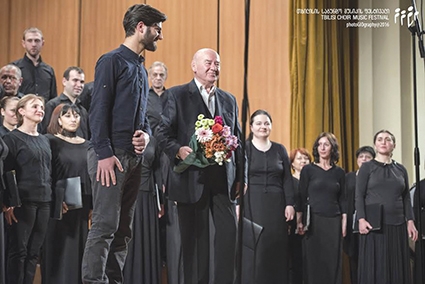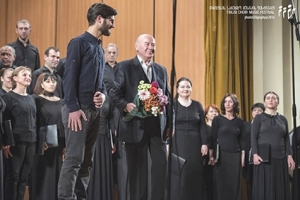Hungarian Angels in Harmony at Tbilisi Conservatory
The 6th Tbilisi International Festival of Choral Music took place from April 2 to April 12. The closing gala on the last day was extremely multicolored, enriched as it was with different local choirs, including some from the Georgian regions. The main discovery was the world-famous Hungarian Girls’ Choir ‘Angelica,’ who fully justified their name and, like angels, led gave us a truly heavenly experience.
Shortly after the organizers opened the evening, the floor was given to Hungarian Ambassador, Sandor Szabo: “We are very glad that the Tbilisi International Choral Music Festival gives a platform for outstanding foreign choirs, like the ‘Angelica’ girls’ choir from Budapest. It’s heart-warming to see how choral music brings people together from all over the world and strengthens the cultural cooperation between our nations.”
The first Hungarian diplomat went on to speak of the choir’s international success story over the last two decades – their tours in North and South America, Europe and he Far East. “Among many others, they sang in the Notre-Dame Cathedral in Paris, the Saint Peter’s Cathedral in Rome, the Saint Michael’s Cathedral in Brussels and in the European Parliament.” The ambassador also referred to their repertoire, which reportedly includes pieces of the greatest Hungarian composers, Zoltán Kodály, Béla Bartók and Ferenc Liszt. “In 2015 and 2016 in Hungary we celebrate and commemorate the birth and the passing away of Béla Bartók, whose work also had a significant impact on Georgian classical music.”
Archil Ushveridze, Artistic Director of the Festival, told GEORGIA TODAY, “Every year, we try to make it multicolored in terms of genre, as well as to cover repertoires of different countries to give our audience a new and varied experience. This year, the Hungarian Girls’ Choir performed the Hungarian choral music of the 20th and 21st centuries. One of our main aims is to boost development of the performing level of choral music as well as the choral compositional school. This festival has many bright examples of it.”
We asked Zsuzsanna Graf, Conductor of the Angelica Girls’ Choir to comment. “I was in Georgia last year, and that is when I fell in love with Georgian music. Some Georgian professors have already suggested we work on Georgian musical pieces. We will take them home and perform them,” she said.
Zviad Bolkvadze, Georgian conductor and composer, member of the Festival Board, told us: “The festival is developing - instead of one foreign choir, we had three this year. It is a great stimulus for Georgian musicians to listen to foreign troupes and get acquainted with different musical cultures. This tradition existed in Georgia and was stopped temporarily. Let’s hope that the festival will gain an even larger scale.”
Maka Lomadze











